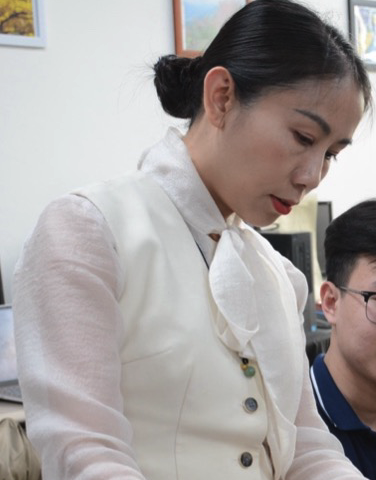Tutorials
Tutorial 1

AI-RAN for Token Communication
Prof. Jihong Park
Singapore University of Technology and Design, Singapore
Presentation File
Abstract
Recent advances in AI technologies and hardware have given rise to the concept of the AI-based radio access network (AI-RAN). By replacing traditional RAN-specific custom processors with general-purpose GPU processors, AI-RAN natively implements AI-driven RAN functionalities, enabling site-specific RAN operations and improving KPIs. It also supports the concurrent hosting of non-RAN applications, enhancing profitability and fostering tighter integration with RAN operations. This vision aligns closely with the emerging paradigm of token communication, which connects intelligent agents such as small and large language models and general-purpose robots through the fundamental AI processing unit, tokens. In this talk, I will highlight key challenges and opportunities in realizing token communication through AI-RAN.
Biography
Jihong Park is an Associate Professor at the Singapore University of Technology and Design (SUTD) and an Honorary Associate Professor at Deakin University. He serves as the Deputy Director for the Future Communications Research and Development Programme (FCP) in Singapore. Prior to joining SUTD, he was a Lecturer at Deakin University, Australia (2020-2024). He received his B.S. and Ph.D. degrees from Yonsei University, Seoul, Korea, in 2009 and 2016, respectively, and worked as a Post-Doctoral Researcher at Aalborg University, Denmark (2016–2017), and the University of Oulu, Finland (2018–2019). His recent research interests focus on AI-native semantic communication and distributed machine learning for 6G. He has served as Symposium/Track Co-Chair for IEEE GLOBECOM’23, ICCC’25, and WCNC’26, and as Workshop Co-Organizer for IJCAI’24, ICML’25, and AAAI’26. He has received several prestigious awards, including the 2023 IEEE Communication Society Heinrich Hertz Award and the 2022 FL-IJCAI Best Paper Award. Currently, Dr. Park is an Editor of IEEE Transactions on Communications, a Member of IEEE Signal Processing Society’s Machine Learning for Signal Processing Technical Committee, and Vice Chair of the AI-RAN Alliance’s AI-on-RAN Working Group.
Tutorial 2

Optimizing Immersive Media Streaming: From 360° Video To Volumetric Experiences
Prof. Truong Thu Huong
Hanoi University of Science and Technology, Vietnam
Presentation File
Abstract
Extended Reality (XR) applications are driving an unprecedented demand for high-quality immersive media, from panoramic 360-degree videos to interactive volumetric content. However, delivering these experiences over bandwidth-limited and dynamic networks poses significant challenges. This tutorial introduces students to two cutting-edge research directions in XR streaming: (i) adaptive 360-degree video streaming and (ii) volumetric video streaming.
Together, these two topics highlight optimization challenges and solutions across different XR media formats. Students will gain insights into adaptive algorithms, quality trade-offs, and the future directions of immersive media delivery, preparing them to engage with next-generation XR applications in entertainment, education, and beyond.
Biography
Truong Thu Huong is an Associate Professor and Deputy Head of the Department of Communication Engineering at the School of Electrical and Electronic Engineering, Hanoi University of Science and Technology (HUST), Vietnam. At HUST, she combines her roles in teaching, research, and academic leadership. She is also a founding member of the Future Internet Group at the Advanced Networks and Smart Applications Laboratory (ANSA).
Her research interests include next-generation networks, multimedia communications, QoE/QoS optimization, extended reality (XR) streaming, AI-driven networking, network security, and green networking. She has published extensively in leading journals and has been actively engaged in international collaborations on networking, edge/cloud computing, network security, and immersive media.
Her publications, co-authored with students and colleagues, have received three IEEE Best Paper Awards. She has also been honored with three Distinguished Lecturer Awards given by Hanoi University of Science and Technology, and the Ministry of Education and Training of Vietnam. She also received the Prime Minister's Certificate of Merit. She serves regularly as a reviewer for high-impact international journals and as a program committee member and session chair at IEEE conferences.
Tutorial 3

Toward 6G-Native Intelligence: Data-Driven Approaches for AI-RAN
Prof. Hyunggon Park
Ewha Womans University, South Korea
Presentation File
Abstract
The emergence of AI-based Radio Access Networks (AI-RAN) marks a paradigm shift in next-generation wireless systems, where artificial intelligence and machine learning (AI/ML) serve not as add-on functionalities but as foundational elements for network operation, optimization, and orchestration. This tutorial focuses on network data analytics for efficient intelligence integration. We begin by examining how network telemetry, including Key Performance Indicators (KPIs), can be systematically leveraged for AI/ML-based inference and decision-making. As a representative example, we highlight recent research on network slice classification in O-RAN environments, which illustrates the importance of data-efficient learning for AI-RAN. By integrating architectural perspectives with practical case studies, this tutorial aims to equip researchers and practitioners with insights into how AI/ML-driven network analytics can enable scalable, reliable, and resource-efficient AI-RAN, paving the way toward 6G-native intelligence.
Biography
Hyunggon Park (Senior Member, IEEE) received the B.S. degree in electronics and electrical engineering from the Pohang University of Science and Technology (POSTECH), Pohang, South Korea, in 2004, and the M.S. and Ph.D. degrees in electrical engineering from the University of California at Los Angeles (UCLA), Los Angeles, CA, USA, in 2006 and 2008, respectively. He was a Senior Researcher with the Signal Processing Laboratory (LTS4), Swiss Federal Institute of Technology (EPFL), Lausanne, Switzerland, from 2009 to 2010, and Researcher with the Alan Turing Institute, London, U.K., from 2020 to 2021. He is currently a Professor with the Department of Electronic and Electrical Engineering, Ewha Womans University, Seoul, South Korea. His research interests include resource management algorithms for multiagent systems, AI-based data analytics and anomaly detection, and communication efficient AI model design.


